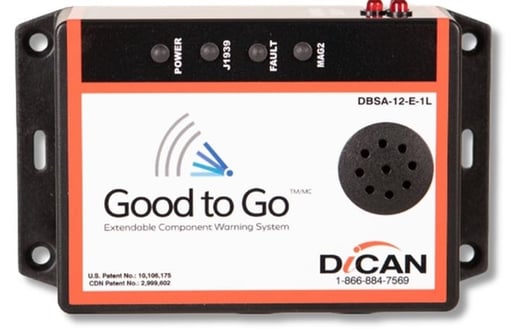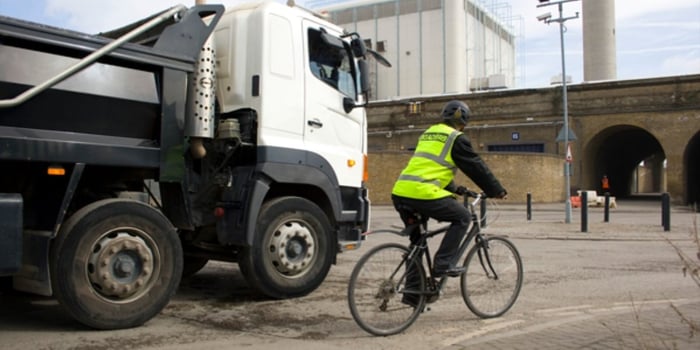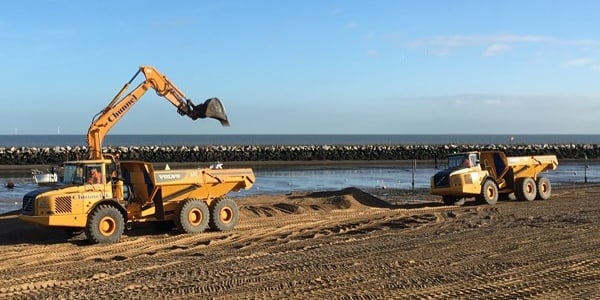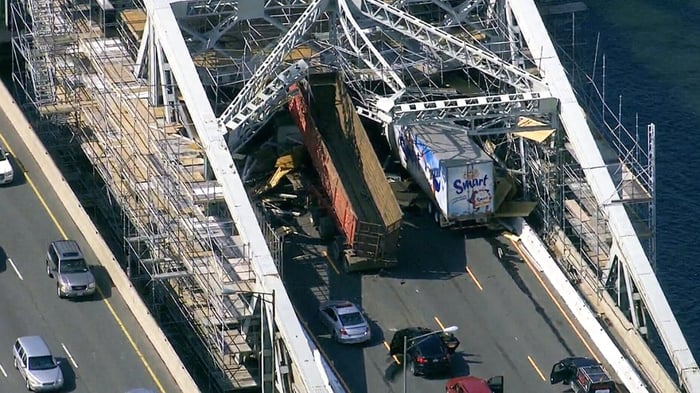
Table of Contents
Heads Up, Boxes Down
In the past decade, there have been several high-profile dump truck accidents that made headlines across Canada. These incidents are not only dangerous but also cause significant financial and infrastructural damage.
It's high time we take a closer look at these accidents, analyze their causes, and identify the best possible solutions for preventing them in the future.
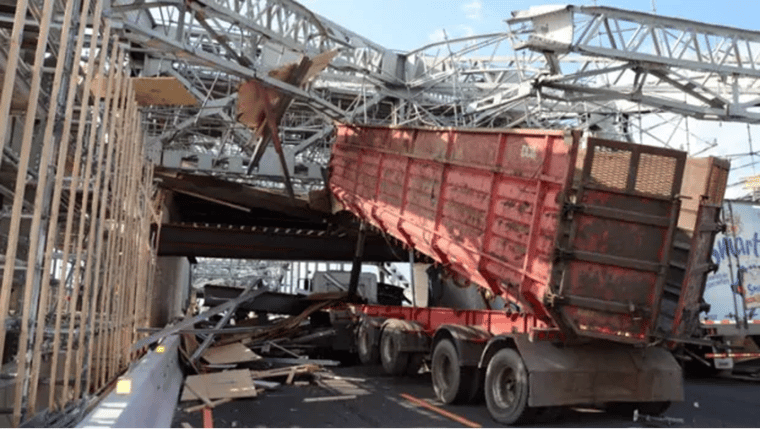
Image of the Burlington Skyway incident in Ontario on July 31, 2014, involving a dump truck collision. Credit: Hamilton Police Service
https://www.cbc.ca/news/canada/hamilton/trucker-who-crashed-dump-truck-in-burlington-skyway-sentenced-to-jail-time-1.3683838
The High-Profile Toronto Dump Truck Accident (2014): A Case Study
The infamous Burlington Skyway crash in 2014 is one of the most notorious dump truck accidents in recent memory. The driver crashed his raised dump truck into the Skyway’s overhead steel trusses and girders, causing over a million dollars in damages and a four-day bridge closure. It typically carries about 80,000 vehicles per day.
The driver was sentenced to a year in jail and given a three-year driving prohibition. The trial revealed that outdated safety equipment on the truck could have contributed to the accident.
More Recent Raised-Box Dump Truck Accidents
Recent accidents involving raised dump truck boxes, such as the Brampton accident on October 25, 2022, and the Whitby incident on January 6, 2023, continue to raise concerns over the urgency of addressing this dangerous issue.
In both cases, the drivers operated their trucks with raised boxes, resulting in catastrophic collisions with overhead structures. The Brampton accident damaged a gas station canopy, while the Whitby event led to an overhead sign collapsing onto the westbound lanes of Highway 401, causing hours of standstill traffic. Fortunately, no one was seriously injured in either case, but the potential for disastrous consequences was alarmingly high. These incidents underscore the pressing need for increased driver awareness, improved safety mechanisms, and stricter regulations to prevent such perilous accidents from recurring in the future.
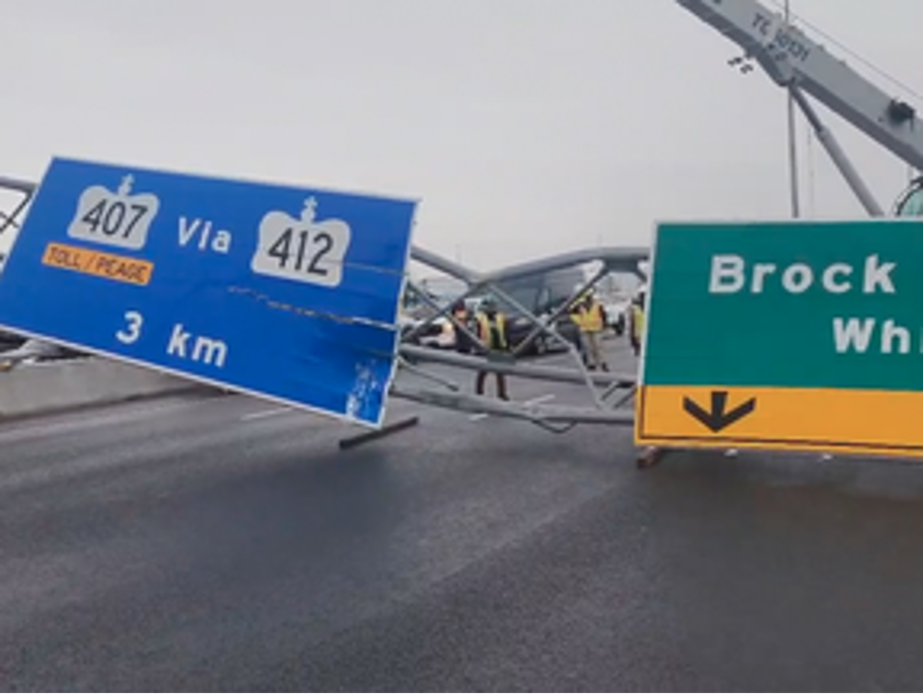
Image of a damaged Highway 401 sign in Whitby after a truck collision on January 6, 2023. Credit: @OPP_HSD / Twitter https://torontosun.com/news/local-news/should-never-happen-transport-truck-with-box-up-brings-down-hwy-401-signs-in-whitby
Truck operators must remain vigilant and double-check that their dump boxes are lowered before hitting the road. Management should support operators by investing in a solution that ensures drivers are alerted when they are traveling with a raised box.
Causes and Consequences of Raised Dump Box Accidents
Raised dump box accidents are caused by a range of factors, including human error, mechanical failure, and inadequate safety equipment. The consequences of such accidents are severe, ranging from property damage to potential loss of life.
The menace of raised dump truck boxes cannot be overstated, as they are prone to striking overhead obstacles such as power lines, bridges, and signs, wreaking havoc in their path. Furthermore, these incidents have a significant financial impact on the industry and the public, highlighting the urgent need for improved safety measures.
Regulatory Landscape and Industry Standards
In Quebec, the Highway Safety Code was amended to require specialized equipment for all vehicles (including trucks, trailers, and semi-trailers) with a dump body. Since September 1, 2020, all vehicles covered by the Regulation must be equipped with flashing red warning lights and audible alerts, and offenders face fines ranging from $350 to $1,050.
While the government of Quebec has taken the lead in implementing safety regulations for raised dump trucks, other provinces like Ontario have yet to follow suit. This lag in regulatory action exposes a gap in the industry's safety standards, which must be addressed to prevent further accidents.
Solutions
Thankfully, there are solutions to the problem of raised dump box accidents. In this section, we will examine various technological options and compare their strengths and weaknesses. By delving into micro switches, hydraulic pressure switches, proximity sensors, and non-contact magnetic reed switches, we aim to provide insight into the most effective measures available.

Micro switches are simple, electro-mechanical devices that activate or deactivate an electrical circuit based on the position of the switch. They come in various forms, such as roller, lever, whisker arm, plunger, and limit switches. While they are affordable and easy to install, they can be susceptible to wear and tear, corrosion, and may be easily bypassed by operators, which may compromise their overall effectiveness in preventing raised dump box accidents.

Hydraulic pressure switches are designed to monitor the pressure in hydraulic systems, triggering a response when a specific pressure threshold is reached. They can be used to detect when a dump box is raised, alerting the driver or activating a safety mechanism. However, these switches can be expensive and labor-intensive to install, and they may experience issues with leaking and "stiction," where the switch sticks and does not release as intended.

Proximity sensors are devices that detect the presence of objects without making physical contact. They use electromagnetic fields, light, or sound waves to measure the distance between the sensor and the target object. When applied to dump trucks, proximity sensors can detect if the dump box is raised and send an alert or initiate a safety mechanism. Although they offer high reliability and a long functional life, they can be vulnerable to weather-related failures and may be easily bypassed, limiting their effectiveness as a safety solution.

Non-contact magnetic reed switches are sensors that detect the presence of magnetic fields to determine the position of an object, such as a raised dump box. They consist of two ferrous reed elements enclosed in a hermetically sealed glass capsule, which react to the presence of a magnetic field. These switches are highly resistant to dirt and contaminants, offer a wide sensing distance, and are virtually indestructible.

The Good to Go™ Alarm by DiCAN Inc. is a non-contact magnetic reed switch system that provides a reliable, precise, and maintenance-free solution for dump box position sensing. Since its creation in 2012, this innovative device has set the standard in dump truck safety. The Good to Go™ Alarm connects seamlessly to a vehicle's OBD port, providing a secure and efficient connection for real-time monitoring of the vehicle’s speed. The first of its kind, capable of not only monitoring the position of the dump box but combining this information with data from the ECM to allow for advanced applications like shouldering without giving false positives. This system ensures safety and efficiency, making it an ideal choice for fleet managers and operators.
Good to Go Alarm by DiCAN Inc.
The Good to Go™ Alarm by DiCAN Inc. is a non-contact magnetic reed switch system that provides a reliable, precise, and maintenance-free solution for dump box position sensing. Since its creation in 2012, this innovative device has set the standard in dump truck safety.
The Good to Go™ Alarm connects seamlessly to a vehicle's OBD port, providing a secure and efficient connection for real-time monitoring of the vehicle’s speed. The first of its kind, capable of not only monitoring the position of the dump box but combining this information with data from the ECM to allow for advanced applications like shouldering without giving false positives. This system ensures safety and efficiency, making it an ideal choice for fleet managers and operators.
The Good to Go™ Alarm - control unit. U.S. Patent No.: 10,106,175 CDN Patent No.: 2,999,602 https://www.dicaninc.com/good-to-go
Subscribe Here!
Recommendations for the Future
As we look toward the future of dump truck safety, it is essential to embrace a proactive approach to prevent raised dump box accidents. We must continuously invest in research and development to discover new and improved technologies, ensuring the industry remains at the forefront of safety innovation.
Collaboration between stakeholders, including truck manufacturers, fleet operators, and regulatory bodies, is crucial to implement comprehensive and uniform safety standards across the board. We recommend implementing mandatory safety regulations, increasing public awareness and education, and adopting reliable safety systems like the Good to Go™ Alarm to prevent future raised dump box accidents. Lastly, leveraging data-driven insights and predictive analytics can enable us to identify potential risks and patterns before they escalate, shaping a safer, more efficient, and responsible future for the entire dump truck industry.


